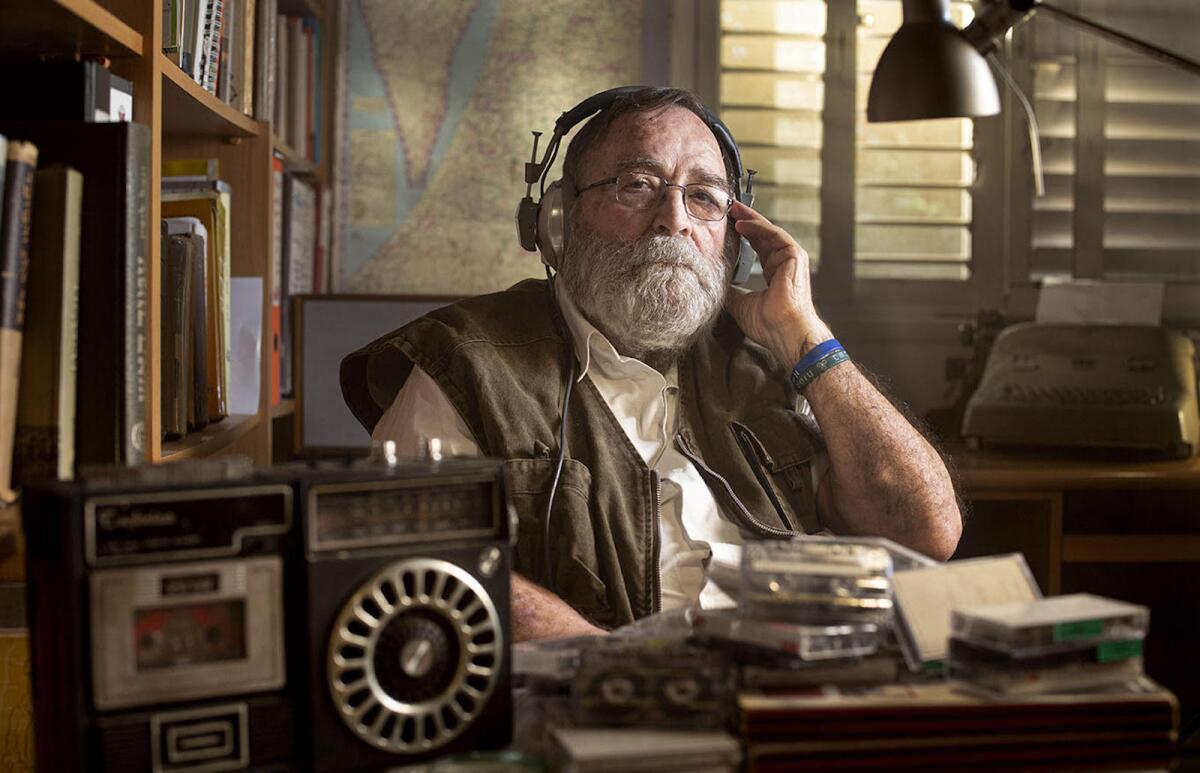The tragedy of ‘Tantura’ examined in compelling new documentary

- Share via
“You cannot create a safe haven by creating a catastrophe for other people,” says Ilan Pappé, a professor at the University of Haifa, about the post-World War II founding of the state of Israel in the blistering and defiant documentary “Tantura.”
To investigate the validity of that strong proclamation, director Alon Schwarz (“Aida’s Secrets”) concentrates on the seaside town of Tantura. Once a prosperous fishing village, it became the site of a massacre perpetrated by the Alexandroni Brigade early in the 1948 campaign to take over Palestine — known by Israelis as the War of Independence.
For your safety
The Times is committed to reviewing theatrical film releases during the COVID-19 pandemic. Because moviegoing carries risks during this time, we remind readers to follow health and safety guidelines as outlined by the CDC and local health officials.
For Palestinians, the onset of their tragic displacement is known as the nakba.
Details of what took place in Tantura more than 70 years ago had remained secret, a taboo subject that contradicts the idealized self-image of the Israeli state. But in the late 1990s, scholar Teddy Katz interviewed many of the soldiers involved as part of his master’s thesis.
In those in-depth conversations they begrudgingly corroborated the brutal slaughter of hundreds of Palestinians, mostly men, and the disposal of their bodies in mass graves. Notable too is the dehumanizing language they use to refer to their “enemies.”
After the media learned of Katz‘s findings, the Alexandroni men retracted their statements and sued him, effectively ending his career and silencing the truth. Now Katz has shared the tapes with Schwarz, who uses excerpts, as well as new interviews with those soldiers still alive, to construct a damning exposé of a nation unwilling to admit its primordial sins.
Some of those who agree to speak with Schwarz, now in their 90s, admit to having witnessed the crimes, but deny taking part in them. Others, emboldened perhaps by their advanced age, and more so by the impunity their status as heroes grants them, confess to the killings. An eerie score by Ophir Leibovitch accompanies their chilling accounts.
Yet, they all distance themselves from any direct blame, justifying the events as the inevitable cost of war. Every time Schwarz offers them an opportunity to examine their own behavior, to show remorse, to consider the effect of their actions, or of their inaction, they default to the language instilled in them about the righteousness of their cause.
Therein lies the earth-shattering power of “Tantura,” because as long as the perpetrators refuse to acknowledge responsibility for what happened, healing cannot commence. But neither the veteran soldiers, nor the Israeli government, will own up to this history, because admitting to the massacre would challenge the legitimacy of the state as a whole. And if the recognition of any wrongdoing seems unfeasible, then so are any talks of reparations.
Late in the documentary, Schwarz speaks with elderly Israeli civilians who arrived in Tantura as children. Their opinions range from those who believe Palestinians should surrender all claims to the land, while others, in a show of limited empathy, would agree to a monument to the memory of those buried there as long as it’s not taken as a sign of ownership.
Only a couple of Palestinians with memories from the time offer their testimony. Their presence serves as a reminder of the devastation that families endured. While the Alexandroni soldiers have enjoyed longevity and veneration, their victims’ remains never received a proper burial, and, as Schwarz’s research implies, they may now be lost forever.
Still, for all the institutionalized pushback to avoid confronting this instance of “ethnic cleansing,” as one expert describes it, it’s also the bravery of the Israeli academics who share their perspectives on screen that can have the most impact. They dare to publicly question the official story in a society that demands absolute loyalty to its origin myth.
Though Schwarz’s finished film provides unmissable and infuriating insight, it’s also disappointing that he never mentions the ongoing violence that the Israeli state commits against residents in the current Palestinian territories, including numerous documented human rights violations.
Watching “Tantura,” one could assume that the nakba was the extent of the military conflict, rather than the cornerstone of decades of oppression with no end in sight.
‘Tantura’
In Hebrew and Arabic with English subtitles
Not Rated
Running time: 1 hours, 34 minutes
Playing: Starts Dec. 2, Laemmle Monica Film Center, Santa Monica
More to Read
Only good movies
Get the Indie Focus newsletter, Mark Olsen's weekly guide to the world of cinema.
You may occasionally receive promotional content from the Los Angeles Times.









